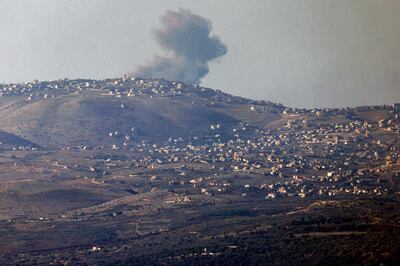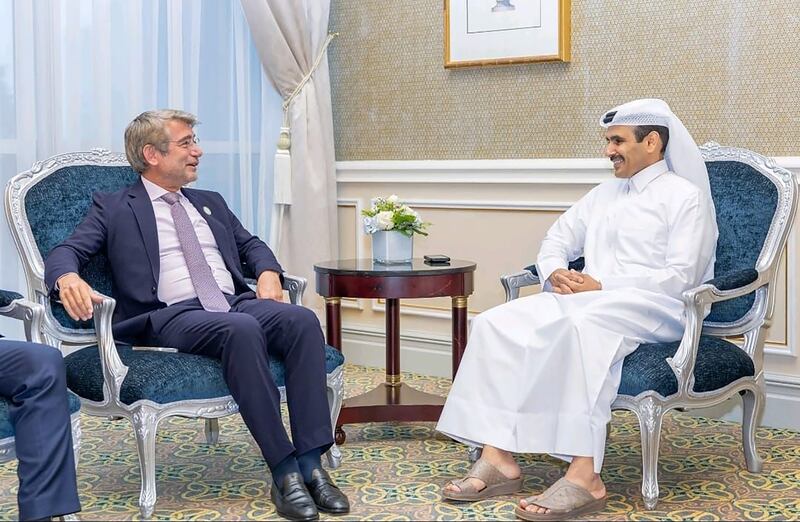Live updates: Follow the latest news on Israel-Gaza
Lebanon’s caretaker Minister of Energy and Water has said a historic maritime border deal with Israel still stands despite the intensifying conflict between Hezbollah and Israel's military.
Walid Fayad was visiting Dubai to attend the Cop28 talks, which opened last month with a milestone deal to launch and capitalise a loss and damage fund that helps the most vulnerable countries deal with the worst effects of climate change.
Hezbollah has its own troops in Lebanon and its political wing has ministers in government and legislators in parliament. The Iran-supported group also has deep ties to Hamas, which rules Gaza, and the Palestinian Islamic Jihad faction.
“What we are seeing is that there is no impact” on the agreement, Mr Fayad told The National.
“This isn’t a source of conflict any more, and it isn't part of the equation.”
Hezbollah has been embroiled in the border conflict with Israel since October 8 in support of its ally Hamas. The conflict has not erupted into full-scale war, although daily confrontations threaten to tip the scale.
Tens of thousands of residents have been displaced on both sides of the border.
In Lebanon, at least 120 people have been killed, most of them Hezbollah fighters, but also dozens of civilians. Israel's military says six Israeli soldiers and four civilians have been killed.
The fighting continues to intensify by the day as both sides wage a war of deterrence, Hezbollah in an attempt to distract Israel from the war in Gaza, and Israel in an attempt to prevent the militia from influencing the outcome of the conflict.
Mr Fayad said that as long as the border clashes are "within the current equation", then the impact shall “remain the same.”
However, he warned that an escalation is still possible, but “it’s in the hands of the Israelis. They are the ones conducting aggressions against the Palestinians”.
Continuing negotiations
Lebanon and Israel, which technically remain at war, signed the maritime deal in October last year, concluding nearly a decade of US efforts led by envoy Amos Hochstein.
Hezbollah, which fought a month-long war with Israel in 2006, communicated its position to Lebanese politicians, explaining that while it did not support the agreement, it had no intention to block it.
Lebanon's long-awaited exploratory offshore oil and gas drilling began ten months later. The country’s political leadership has pinned its hopes on potential hydrocarbon reserves as a source of foreign currency for the cash-strapped nation.
The country is grappling with unparalleled financial turmoil. Its currency's value has plummeted by more than 98 per cent against the dollar since in 2019, pushing 80 per cent of the population into poverty.
“General instability complicates the exploratory drilling job, but we expect our partners to stay committed and continue with this commitment because any halt won’t be accepted on the political level,” said the Minister.
French oil company TotalEnergies is leading the drilling consortium, along with Italian company ENI and state-owned QatarEnergy. No hydrocarbon finds were announced after exploratory drilling operations at Lebanon's offshore Block 9 in October.

Mr Fayad said negotiations with energy companies “are ongoing to speed up the timelines” of exploratory drilling in all the blocks, despite the tension with Israel.
“We have sent messages, and we are waiting for feedback. The companies have six months to submit the final report for Block 9, but we would like to see that as soon as possible so we can move to other areas.”
Last month, Mr Hochstein told The National he was confident the maritime agreement would not be affected by the war and that offshore gas could be found, as exploration takes time.
The Levant Basin in the eastern Mediterranean has among the world's largest natural gas reserves. The US Geological Survey estimates that the basin – stretching across the waters of Cyprus, Egypt, Israel, Lebanon and Palestine – contains 122.4 trillion cubic feet of technically recoverable gas.
Rain levels dropping
Mr Fayad said Lebanon “welcomed the UAE’s achievement and strategies” in hosting the Cop28 UN climate talks, adding that his country “deserves to be part" of the loss and damage fund because of the negative impact of climate change.
“The rain levels have dropped, while the demographic scene has increased, affecting our water reserves. In the past, it was 2,000 cubic metres per person per year, now it’s under 600,” he said.
“It’s necessary that we get a portion of the adaptation scheme,” he emphasised, calling at the same time for investments in the Lebanese energy sector to help fix the electricity problem that his country has been facing for decades.
Lebanon's state-provided electricity is in a shambles amid financing troubles and governance paralysis that has prevented previous electricity plans from taking effect.
Lebanon’s residents have depended on expensive shared generator networks since the end of the country’s 1975-1990 civil war when the nation’s power infrastructure was devastated.
State-supplied electricity has become almost non-existent since Lebanon’s economic crisis began in 2019. Once switched on for a few hours a day to fill gaps in state electricity provision, generators have become a primary power source in most households.
But Mr Fayad argued that Lebanon has seen a rise in reliance in the share of renewable energy, especially solar power, in recent years.
“In 2022 alone, we saw investments worth one billion dollars in renewable energy. This is significant for a country like Lebanon.”
“However, we need more investments to increase our capacity to produce more electricity. We need more solar power. We need more agreements,” he added.






